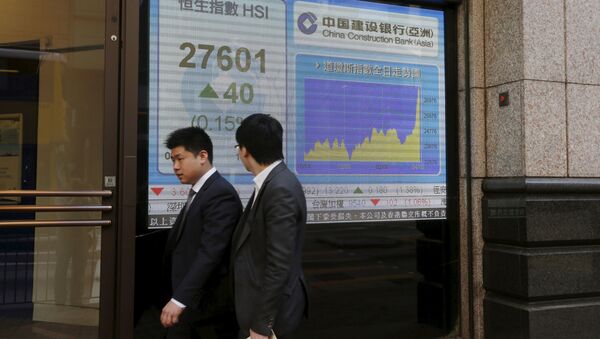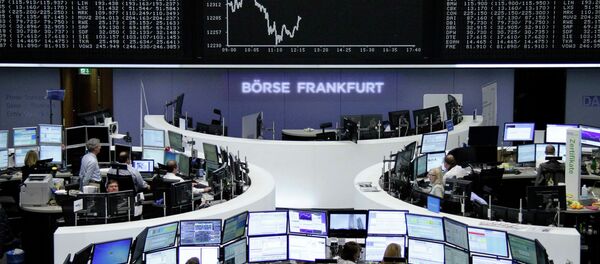Kristian Rouz — Equity trading during the late Monday-early Tuesday sessions was mostly in the green across the globe, with select indices returning to their historic highs on strong corporate data from both the US and Europe, while Beijing fueling speculation of its own bond-buying rendered investors even more bullish on stocks.
US Markets Advance on Solid Corporate Data, China Easing
Wall Street was significantly up at the close on Monday after mainland China further cut their reserve ratio requirements (RRRs) 1% for commercial banks earlier that day, while investors were also buying tech shares on Wall Street amidst expectations of stronger profits data.
Reverse-repo operations, however, are expected to be resumed by Beijing in Q2, as the overall economy is still slowing. That means China's stock markets are poised to grow against the background of such weird easing practices. The European-style full-scale stimulus is at the moment hardly possible as it would mean a huge bubble in China's gray finance.
After China moved to spur lending, providing an optimistic sentiment on Wall Street, investors took their eyes to commercial reports. Apple Inc. led gains Monday, adding 2.28% to its stock, while IBM jumped even higher, up 3.42%, in midday trading, only to shrink 0.17% later on a disappointing earnings report. However, the tech sector on S&P 500 added 1.79% by the close.
The Dow Index rose 1.17%, the S&P 500 advanced 0.92% and the Nasdaq added 1.27% Monday. This week, major tech enterprises report their earnings, among them will be Facebook, Google, Qualcomm, Amazon and Microsoft, investors expectations are optimistic.
Up to this point, some 76% of S&P-listed firms have reported better-than-expected earnings, beating last year's 70% average. Despite the speculation that a strong dollar would hurt profits significantly, the actual numbers have shown America's corporate sector is already mostly domestically driven, as overseas corporate earnings have of course suffered.
The US dollar was 0.44% up against its major peers, having risen 8% since the start of this year. US major indices are just some 2% below their historic highs, despite such global risks as possible defaults in Greece (likely not happening), Ukraine (still a possibility), economic turbulence in China and the recession in Russia — indicating that the US is starting to exercise some form of economic isolationism as global issues do not seem to affect the situation here.
Asian Stocks Boosted by PBOC Further Cut in RRRs
In Asia-Pacific stocks rallied on Tuesday naturally, driven by mainland China easing move (the RRR cut by 1% to 18.5%). The Shanghai Composite Index rose by 1.8%, having set a new 7-year high. The overall market sentiment in the mainland is bullish over-the-top, which does not seem to have an end in sight. China's markets are rightfully expecting easy money from Beijing; there's little doubt they will receive it.
The Aussie dollar slid 0.3% to $0.7696 Tuesday.
In Japan, the Nikkei 225 Index posted gains on the upbeat corporate data, a stronger dollar the reason. Mitsubishi rose 3.5%, Toyota added 2.2%, having sold more overseas. The camera-maker, Canon, shed 0.8% following the reported 15% decline in sales in Q4 — in the era of Instagram less people need proper cameras, as the mobile devices market is thriving. Japanese pharma shares were also up, with Daiichi adding 4.4%, selling their stake in India's Sun Pharmaceutical Industries, the latter suffering financial losses.
European Enterprises Drive the Markets Up Despite Murky Global Outlook
In Europe, solid corporate data and confidence in the happy ending for the Greece situation pushed shares up. The German software-maker SAP SE and the biotech Actelion both posted better-than-expected earnings, among many other firms.
The Stoxx Europe 600 Index rose 0.6% in London, with a slight retreat in German investor confidence dragging gains lower from the midday figure of 1.3%. A weaker euro was also a factor, having slid to $1.0670 from its Friday peak of $1.08, as the speculation of a possible Greek default prompted a sell-of in the common currency after ECB Vice President Vitor Constancio said the defaulted nation would not necessarily need to exit the Eurozone.
The pan-European FTSEurofirst 300 rose 0.6%. In Germany, investor confidence sagged, however, for the first time in six months, with the closely watched ZEW index dropping to 53.3 in April from 54.8 the previous months, against the expected rise to some 55.3. Investors are worried European exporters would not be able to increase exports, the main source of growth now, as overseas consumer demand is shrinking. Still, Germany is expected to expand 2% this year, compared to 1.6% in 2014.
In Commodities, oil and gold retreated on the dollar's advance. Brent crude slid to $62.9/bbl, while the US crude futures retreated to $55.94/bbl.





